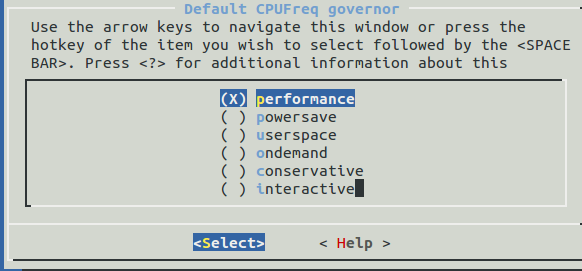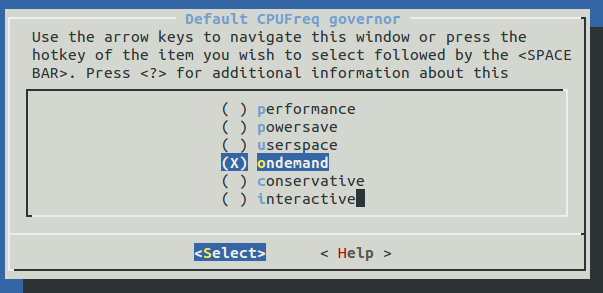CPU dominant frequency related information
root@am335x-evm:/sys/devices/system/cpu/cpu0/cpufreq# ls affected_cpus scaling_cur_freq cpuinfo_cur_freq scaling_driver cpuinfo_max_freq scaling_governor cpuinfo_min_freq scaling_max_freq cpuinfo_transition_latency scaling_min_freq related_cpus scaling_setspeed scaling_available_frequencies stats scaling_available_governors
- cpuinfo_cur_freq: current CPU working frequency, the working frequency read from the CPU register.
cpuinfo_max_freq: the highest operating frequency that the processor can run (unit: KHz).
cpuinfo_min_freq: the lowest operating frequency that the processor can run (unit: KHz).
cpuinfo_transition_latency: the time required for the processor to switch frequency (unit: ns).
scaling_available_frequencies: list of main frequencies supported by the processor (unit: KHz).
scaling_available_governors: all types of Governors supported in the current kernel.
scaling_cur_freq: saves the current CPU frequency cached by the cpufreq module and does not load the CPU hardware register
Line check.
scaling_driver: this file saves the FM driver used by the current CPU.
scaling_governor:governor (frequency modulation) strategy, the Linux kernel has a total of 5 medium frequency strategy:
① , Performance, the highest Performance, directly using the highest frequency, regardless of power consumption.
② Interactive, first directly use the highest frequency, and then slowly reduce it according to the CPU load.
③ Powersave, a power-saving mode, usually operates at the lowest frequency, which will affect the system performance. Generally, this mode is not used!
④ Userspace, which can manually adjust the frequency in the user space.
⑤ , Ondemand, check the load regularly, and then adjust the frequency according to the load. When the load is low, reduce the CPU frequency to save power. When the load is high, increase the CPU frequency and increase performance
root@ATK-IMX6U:~# cat /sys/devices/system/cpu/cpu0/cpufreq/cpuinfo_cur_freq 792000
cat /sys/devices/system/cpu/cpu0/cpufreq/scaling_available_frequencies 198000 396000 528000 792000
root@ATK-IMX6U:~# cat /proc/cpuinfo processor : 0 model name : ARMv7 Processor rev 5 (v7l) BogoMIPS : 12.00 Features : half thumb fastmult vfp edsp neon vfpv3 tls vfpv4 idiva idivt vfpd32 lpae CPU implementer : 0x41 CPU architecture: 7 CPU variant : 0x0 CPU part : 0xc07 CPU revision : 5 Hardware : Freescale i.MX6 Ultralite (Device Tree) Revision : 0000 Serial : 0000000000000000
The higher the bogops is, the higher the MIPs is.
View the main frequency attribute settings in the kernel
CPU Power Management -> CPU Frequency scaling -> CPU Frequency scaling -> Default CPUFreq governor

However, in the future actual product development, from the perspective of power saving, it is recommended to use ondemand mode, which can save power and reduce heating.
Modify the mode to ondemand

After compiling zImage, check the parameters after startup
root@ATK-IMX6U:~# cat /sys/devices/system/cpu/cpu0/cpufreq/cpuinfo_cur_freq 528000
The current frequency is reduced to 528M
root@ATK-IMX6U:~# cat /proc/cpuinfo processor : 0 model name : ARMv7 Processor rev 5 (v7l) BogoMIPS : 6.00 Features : half thumb fastmult vfp edsp neon vfpv3 tls vfpv4 idiva idivt vfpd32 lpae CPU implementer : 0x41 CPU architecture: 7 CPU variant : 0x0 CPU part : 0xc07 CPU revision : 5 Hardware : Freescale i.MX6 Ultralite (Device Tree) Revision : 0000 Serial : 0000000000000000
BogoMIPS values are getting smaller
Add new frequency 696MHz
Modify the device tree file arch / arm / boot / DTS / imx6ull dtsi
cpus {
#address-cells = <1>;
#size-cells = <0>;
cpu0: cpu@0 {
compatible = "arm,cortex-a7";
device_type = "cpu";
reg = <0>;
clock-latency = <61036>; /* two CLK32 periods */
operating-points = <
/* kHz uV */
996000 1275000
792000 1225000
528000 1175000
396000 1025000
198000 950000
>;
fsl,soc-operating-points = <
/* KHz uV */
996000 1175000
792000 1175000
528000 1175000
396000 1175000
198000 1175000
>;
Add support for 696MHz
cpus {
#address-cells = <1>;
#size-cells = <0>;
cpu0: cpu@0 {
compatible = "arm,cortex-a7";
device_type = "cpu";
reg = <0>;
clock-latency = <61036>; /* two CLK32 periods */
operating-points = <
/* kHz uV */
996000 1275000
792000 1225000
696000 1175000
528000 1175000
396000 1025000
198000 950000
>;
fsl,soc-operating-points = <
/* KHz uV */
996000 1175000
792000 1175000
696000 1175000
528000 1175000
396000 1175000
198000 1175000
>;
make ARCH=arm CROSS_COMPILE=arm-linux-gnueabihf- dtbs
After compilation, use the new device tree file imx6ull alientek_ emmc. DTB boot Linux
cat /sys/devices/system/cpu/cpu0/cpufreq/scaling_available_frequencies 198000 396000 528000 696000 792000
696M frequency in options